Women in 1971
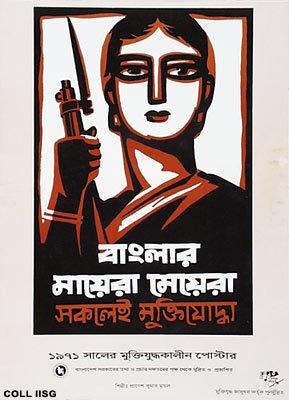
Gen. A. A. Khan Niazi did not deny rapes were being carried out and opined, in a Freudian tone, “You cannot expect a man to live, fight, and die in East Pakistan and go to Jhelum for sex, would you?”
Atrocities against Bengali women:
As was also the case in Armenia and Nanjing, Bengali women were targeted for gender-selective atrocities and abuses, notably gang sexual assault and rape/murder, from the earliest days of the Pakistani genocide. Indeed, despite (and in part because of) the overwhelming targeting of males for mass murder, it is for the systematic brutalization of women that the “Rape of Bangladesh” is best known to western observers.In her ground-breaking book, Against Our Will: Men, Women and Rape, Susan Brownmiller likened the 1971 events in Bangladesh to the Japanese rapes in Nanjing and German rapes in Russia during World War II. “… 200,000, 300,000 or possibly 400,000 women (three sets of statistics have been variously quoted) were raped. Eighty percent of the raped women were Moslems, reflecting the population of Bangladesh, but Hindu and Christian women were not exempt. … Hit-and-run rape of large numbers of Bengali women was brutally simple in terms of logistics as the Pakistani regulars swept through and occupied the tiny, populous land …” (p. 81).
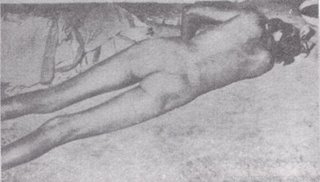
Typical was the description offered by reporter Aubrey Menen of one such assault, which targeted a recently-married woman:
Two [Pakistani soldiers] went into the room that had been built for the bridal couple. The others stayed behind with the family, one of them covering them with his gun. They heard a barked order, and the bridegroom’s voice protesting. Then there was silence until the bride screamed. Then there was silence again, except for some muffled cries that soon subsided. In a few minutes one of the soldiers came out, his uniform in disarray. He grinned to his companions. Another soldier took his place in the extra room. And so on, until all the six had raped the belle of the village. Then all six left, hurriedly. The father found his daughter lying on the string cot unconscious and bleeding. Her husband was crouched on the floor, kneeling over his vomit. (Quoted in Brownmiller, Against Our Will, p. 82.)
“Rape in Bangladesh had hardly been restricted to beauty,” Brownmiller writes. “Girls of eight and grandmothers of seventy-five had been sexually assaulted … Pakistani soldiers had not only violated Bengali women on the spot; they abducted tens of hundreds and held them by force in their military barracks for nightly use.” Some women may have been raped as many as eighty times in a night (Brownmiller, p. 83). How many died from this atrocious treatment, and how many more women were murdered as part of the generalized campaign of destruction and slaughter, can only be guessed at.
Despite government efforts at amelioration, the torment and persecution of the survivors continued long after Bangladesh had won its independence:Rape, abduction and forcible prostitution during the nine-month war proved to be only the first round of humiliation for the Bengali women. Prime Minister Mujibur Rahman’s declaration that victims of rape were national heroines was the opening shot of an ill-starred campaign to reintegrate them into society — by smoothing the way for a return to their husbands or by finding bridegrooms for the unmarried [or widowed] ones from among his Mukti Bahini freedom fighters. Imaginative in concept for a country in which female chastity and purdah isolation are cardinal principles, the “marry them off” campaign never got off the ground. Few prospective bridegrooms stepped forward, and those who did made it plain that they expected the government, as father figure, to present them with handsome dowries. (Brownmiller, Against Our Will, p. 84.)Source: Gendercide Watch
Books:
* Genocide in Bangladesh (1972) by Kalayan Chaudhury, Orient Longman, pp 157-158Rape of Dhaka University students in 1971
“ …..Some army officer raided the Rokeya Hall, the girls’ hostel of Dacca University, on October 7, 1971. Accompanied by five soldiers, Major Aslam had first visited the hostel on October 3, and asked the lady superintendent to supply some girls who could sing and dance at a function to be held in Tejgaon Cantonment. The superintendent told him that most of the girls had left the hostel after the disturbances and only 40 students were residing but as a superintendent of a girls’ hostel she should not allow them to go to the cantonment for this purpose. Dissatisfied, Major Aslam went away. Soon after the superintendent informed a higher army officer in the cantonment, over the telephone, of the Major’ s mission.
However, on October 7, at about 8 p.m. Major Aslam and his men raided the hostel. The soldiers broke open the doors, dragged the girls out and stripped them before raping and torturing them in front of the helpless superintendent. The entire thing was done so, openly, without any provocation, that even the Karachi-based newspaper, Dawn, had to publish the story, violating censorship by the military authorities. In seven days after liberation about 300 girls were recovered from different places around Dacca where they had been taken away and kept confined by the Pakistani army men. On December 26, altogether 55 emaciated and half-dead girls on the verge of mental derangement were recovered by the Red Cross with the help of the Mukti Bahini and the allied forces from various hideouts of the Pakistani army in Narayanganj, Dacca Cantonment and other small towns on the periphery of Dacca city.
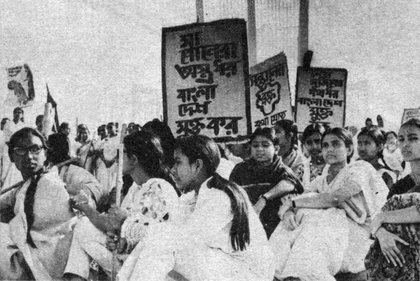
“Although thousands of young Hindu women were killed, the most attractive among them were captured to become sex slaves in the military cantonments. When the girls tried to hang themselves with their clothing, their garments were taken away from them. Then, when they tried to strangle themselves with their long black hair, they were shaved bald. When they became five or six months pregnant, they were released with the taunt: ‘When my son is born, you must bring him back to me’.” (Daktar: Diplomat in Bangladesh by Dr. Viggo Olsen).
Articles:
* Abortion team to travel to Bangladesh -The Bryan Times, February 10, 1972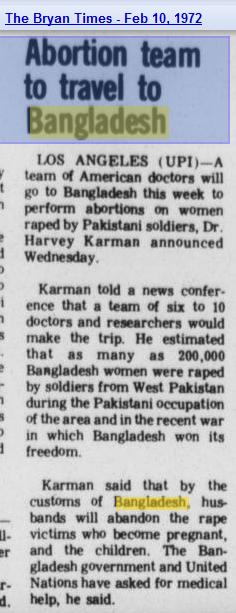 * The Rape of 71: The Dark Phase of History -Dr. M A Hassan
* The Rape of 71: The Dark Phase of History -Dr. M A Hassan…..We have collected numerous evidences on the rape, molestation and torture of Bangalee women by the Pakistani army. Rauful Hossain Suja, the son of martyr Akbar Hossain of Pahartali, Chittagong, went to the FOY’S LAKE KILLING ZONE to look for his father’s dead body. They found dead bodies of approximately 10,000 Bangalees, most of them were brutally slaughtered. In their desperate search for their father’s dead boy, they found dead bodies of 84 pregnant women whose abdomens were slashed open. This type of brutality took place almost every where in Bangladesh. Raped women were also locked up naked in various military camps so as to deny them termination of their anguish through suicide.* The Beswas Village – By Afsan Chowdhury:
As per our statistics on the abortion centers and hospitals around the country, less than 10% of the total raped women visited those centers. In most cases the abortions were done locally and efforts were taken to keep those incidents secret due to social situation. The doctors and specialists, like Dr Anwarul Azim, involved in the hospitals and abortion centers agreed to this statistical information. In reality the raped women who became pregnant after September and less than three months pregnant in early 1972, they did not go the abortion centers and hospitals at all. In our account, the number of women of this category was at least 88,200. Moreover, in those three months, raped 162,000 women and 131,000 Hindu refugee women simply disappeared, assimilated into the vast population, without any report at all.
“I came out and saw the army. They wanted to go inside. I put my hands up like this and said there was no one inside. They flung me away into the yard and dragged my husband and son outside. They shot them both right there, there.* Against Our Will : Men, Women and Rape – By: Susan Brownmiller
They killed every male in the village, every male. When the army was gone, there was not a single man left to bury the dead. We had to drag the bodies ourselves and bury them.”
* – John Hastings, A Methodist missionary worked in Bangladesh for 20 years:A stream of victims and eyewitnesses tell how truckloads of Pakistani soldiers and their hireling razakars swooped down on villages in the night, rounding up women by force. Some were raped on the spot. Others were carried off to military compounds. Some women were still their when Indian troops battled their way into Pakistani strongholds. Weeping survivors of villages razed because they were suspected of siding with the Mukti Bahini freedom fighters told how wives were raped before their eyes of their bound husbands, who were then put to death. Just how much of it was the work of Pakistani “regulars” is not clear. Pakistani officers maintain that their men were too disciplined “for that sort of thing”.
“I am certain that troops have raped girls repeatedly, then killed them by pushing their bayonets up between their legs.”– (from Newsweek)
* War babies: The question of national honor – By Bina D’ Costa
* Ethical Issues Concerning Representation of Narratives of Sexual Violence of 1971 – By Nayanika Mookherjee
* War of Symbols: How today’s generation remembers 1971 - By: Dr. Meghna Guhathakurta
* The Lessons We Never Learn – By: Hameeda Hossain
“It has now become a ritual, come December and March, to bemoan why no justice was exacted from the Pakistan military and its collaborators, for the crimes of genocide and mass rape, committed in 1971. This is not for lack of evidence.”* Distances by Rahnuma Ahmed -on a picture of an women recovered from an Army camp in 12th december 1971 taken by Naibuddin Ahmed:
Girls had been discovered in the bunkers, which were next to the university guesthouse. He went on, I went and found her, she was lying like that. People were milling around her, they were in front of her, they were behind her. I asked them to move, I made some space, and then I took photographs. Girls had been discovered in the bunkers, which were next to the university guesthouse. He went on, I went and found her, she was lying like that. People were milling around her, they were in front of her, they were behind her. I asked them to move, I made some space, and then I took photographs.
War rape intimidates the enemy, says Sally J Scholz. It demoralises the enemy. It makes women pregnant, and thereby furthers the cause of genocide. It tampers with the identity of the next generation. It breaks up families. It disperses entire populations. It drives a wedge between family members. It extends the oppressor’s dominance into future generations.
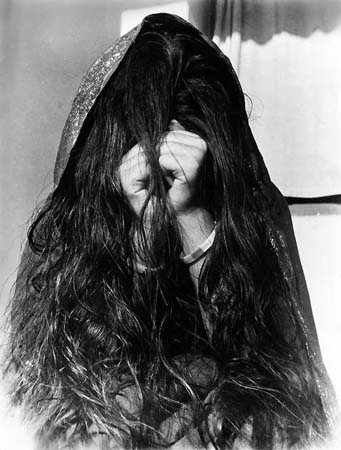
One of the 400,000 birangonas (brave women), who were raped during the war
Photograph: Naib Uddin Ahmed/Autograph ABP & Guardian UK
Historical Documents:
Dr Davis’s Report on Repression of Bangalee Women in 1971Rapes of Bangladesh – By: Audrey Mennen
A New York Times article from 1972
Story of Victims Part 1 and 2 – By Kalyan Choudhury
Tales of Endurance and Courage – Aasha Mehreen Amin, Lavina Ambreen Ahmed and Shamim Ahsan
Other Related Articles
Rape Denials:
* Indian scholar sifts 1971 fact from fiction – Khalid Hasan* The continuing rape of Bangladesh – Mashuqur Rahman
* The continuing rape of our History – Mashuqur Rahman published in the Daily Star
* Sarmila Bose’s “Research” Exposed – Mashuqur Rahman
* Skewing the history of rape in 1971 A prescription for reconciliation? – Nayanika Mookherjee
Courtesy: Drishtipat, The heroines of 1971, Muktadhara

“what you are is god’s gift you,
ReplyDeleteWhat you become is your gift to god”.
“the route you take depends on the decision you make”.
Therefore always think:-
Is it the truth?
Is it fair to all concerned?
Will it build goodwill and better friendship?
Will it be beneficial to all concerned?
You say that our laws are too old.
You say that the municipality does not pick up the garbage.
You say that the phones don't work,
The railways are a joke,
The airline is the worst in the world.
Mails never reach.
You say that our country has been fed to the dogs
And is the absolute pits.
You say, say and say.
What do you do about it?
Take a person on his way to singapore.
Give him a name - yours.
Give him face - yours
you walk out of sahara airport and you are at your international best.
In singapore you don't throw cigarette butts on the roads or eat in the stores.
You are as proud of their underground links as they are.
You pay $5(approx. Rs.220) to drive through orchard road
(equivalent of mahim causeway or peddler road) between 5 pm and 8 pm.
You comeback to the parking lot to punch your parking ticket
If you have overstayed in a restaurant or a shopping mall irrespective of your status &identity.
In singapore you don't say anything.
You do.
In dubai you wouldn't dare to eat in public during ramzan.
In jeddah you would not dare to go out without your head covered.
In london you would not dare to buy an employee of the telephone exchange at 10 pounds
(rs.300) a month to,
"see to it that my std and isd calls
are billed to someone else."
In washington you would not dare to speed and then tell the traffic cop,
Jaanta hai sala main kaun hoon. I am so and so' s son.
Take your two bucks and get lost. "on the beaches of australia and
new zealand you wouldn't chuck an empty coconut shell anywhere other
than the garbage pail.
Why do not you spit paan on the streets of tokyo?
Why don't you buy up the police as well as the secret police to hush up a rape, murder or crime in munich?